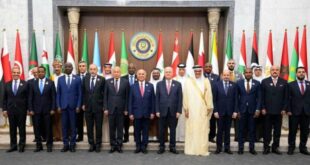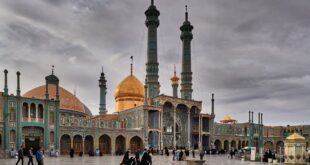Secretary of State Condoleezza Rice said Sunday that key Arab nations, including Syria, would be invited to President Bush’s planned Mideast peace conference this fall and expressed hope they would attend. Formal invitations haven’t been issued yet but Rice said it “would be natural” for Syria, Saudi Arabia and 10 other Arab League members looking at a broad peace deal with Israel to participate despite their hostility to the Jewish state.Â
“It is very important that the regional players of the international community mobilize to support them,” she said, referring to the Israelis and the Palestinians.Â
But, she said their attendance would have to reflect acceptance of international efforts to end the Israeli-Palestinian conflict, and support for the ultimate goal of a two-state solution and comprehensive regional peace agreement.Â
“We would hope that the invitations would include the members of the Arab follow-up committee,” Rice told a news conference here after a meeting of the international diplomatic Quartet on the Middle East — the United States, United Nations, European Union and Russia.Â
Aside from the Palestinians and Arab League Secretary General Amr Moussa, the committee members are Algeria, Bahrain, Egypt, Jordan, Lebanon, Morocco, Qatar, Saudi Arabia, Sudan, Syria, Tunisia and Yemen.Â
Only two of the countries, Egypt and Jordan, have peace deals with Israel and some, notably Syria, remain technically at war with the Jewish state. Earlier this month, Israel is alleged to have launched an airstrike on what some reports have said was a North Korean nuclear facility in Syria.Â
The United States has long been concerned about Syrian development of weapons of mass destruction and has harshly criticized Syria for its consistent anti-Israel stance, support for Palestinian militants and its role in Lebanon where Damascus is accused of interference.Â
Rice did not speak to the appropriateness of inviting Syria to the as-yet unscheduled conference that Bush announced plans for in July and is expected to be held in Washington in November. She said that attendance “has to be a commitment to supporting a two-state solution” and agreement that the chance to end the Israeli-Palestinian conflict is one that “we should not miss.”Â
The Palestinians want the conference to produce an outline for a peace deal; the Israelis want more vague declarations.Â
Many Arab states have said they see no use for Bush’s conference unless it has clear goals and a realistic chance of meeting them. A senior U.S. official said Rice thought she could allay those fears in her talks on Sunday.Â
There was no immediate reaction from Syria.Â
The foreign ministers of two presumable Arab invitees, Prince Saud al-Faisal of Saudi Arabia and Ahmed Aboul Gheit of Egypt, said their countries still had questions about the conference, although they offered generally positive comments about what Rice had told them.Â
“At this point, we cannot estimate or say our final evaluation of the upcoming conference until we receive the answers to the questions that we have raised,” Saud told reporters after a dinner with Quartet members. “We still need some more answers.”Â
Aboul Gheit said he thought most members of the Arab League committee would attend.Â
“I think that this meeting will encourage a lot of us to take part,” he said. “That’s a decision for each and every member of the committee. The majority, I think, will come.”Â
Rice was in the Middle East last week and plans to return to the region soon to continue planning for the conference.Â
Her visit coincided with Israel’s decision to declare the Gaza Strip, which the radical Hamas movement seized in June, as “hostile territory.” That designation dealt a potential blow to efforts to bolster moderate Palestinian President Mahmoud Abbas, who now runs only the West Bank.Â
She conceded Sunday that “the road ahead is one that is very difficult.” But she added: “There is a lot of commitment and hopefully this time we’ll succeed.”Â
In addition to the Israelis, Palestinians and the Arab League committee, those to be invited to the U.S.-hosted conference will include the Quartet members and other major international players and donors, possibly including Japan, officials said.Â
The Quartet’s special representative, former British Prime Minister Tony Blair, gave his backing to the conference, saying it would be a crucial element in taking advantage of what he said was growing momentum in the peace process.Â
As a group the Quartet representatives — Rice, Blair, U.N. chief Ban Ki-moon, Russian Foreign Minister Sergey Lavrov, Portuguese Foreign Minister Luis Amado, E.U. foreign policy chief Javier Solana and E.U. foreign affairs commissioner Benita Ferrero-Waldner — echoed that sentiment.Â
“The Quartet will work for a successful international meeting and for the implementation of its conclusions,” they said in a statement.Â
Sunday’s meeting set the stage for meetings Bush will have in New York on Monday with Blair, Abbas and Palestinian Prime Minister Salam Fayyad.Â
APÂ
 Eurasia Press & News
Eurasia Press & News



